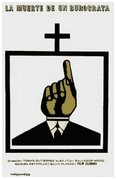Of Cuban cinema

No news of Fidel Castro this morning. No news of Raul, either. Let's assume they are both alive somewhere in Havana, still in charge, ever ready to protect their 11 million subjects from that much-predicted American invasion.
So, for something completely different. Let's talk films. Cuban films.
The first Cuban-made film I recall seeing was called La Muerte de un Burocatra - Death of a Bureaucrat. That was close to 40 years ago.
I watched it at the Teatro Hernandez, which was one of only two cinemas in Banes, the town where I was born, some 15 hours by road East of Havana. Like so many other things in Cuba that changed after the arrival of Fidel Castro, there was a typically half-hearted attempt at one stage to change the name of the Teatro Hernandez to the much more revolutionary Teatro Hanoi. In truth, most people in Banes continued to call it the Hernandez during that time.
Anyway ... Death of a Bureaucrat would become a classic of post-revolutionary Cuban cinema, although I didn't know this at the time. To an eight or nine year old, it was just a very funny, very fast-paced black and white film - unlike those interminably slow, boring Soviet movies that all popped up with deadly predictability at the Hernandez.
Death of a Bureaucrat was the story of a hard-working, well-meaning communist who invents a machine that is able to mass-produce plaster busts of Jose Marti, the pre-eminent hero of the Cuban wars for independence from Spain. Unfortunately, the inventor dies in the process and to honour his excellent revolutionary credentials, his family decides to bury him holding on to his union card. Which is all fine ... until his widow realises she needs the card to collect his pension. Thus ensues a very funny 85 minute satire about a country undergoing huge social and economic changes.
The film was directed by Tomás Gutiérrez Alea, who would become the best known Cuban film director of his generation. He would go on to make other critically-acclaimed films such as Memorias del Subdesarollo and Fresa y Cholocate. The latter received rave reviews internationally when it was released in 1993 for dealing with a topic that had been taboo in communist Cuba for decades, namely homosexuality.
Gutiérrez Alea’s last film before he died was Guantanamera, shot in 1995. Here, he returned to the topic of his 1966 satire – the mind-numbing bureaucracy that is so much a part of the Cuban experience. At least since 1959.
When I saw Guantanamera – not at the Hernandez but at an art house cinema in Sydney, many lifetimes later - it struck me that in many ways, it was the sequel to Death of a Bureaucrat, made some 30 years earlier. And you know what? That mind-numbing bureaucracy was still there. The petty dictates of a State out of control. The need to keep everyone in line and singing exactly the same tune. Or else. Nothing much had changed.
I wonder how much has changed in Cuba since Guantanamera was filmed 10 years ago?


5 Comments:
A casual reader might be confused about this post. Most in the US, for example, beleive that Cuba has no freedom of media and that anything critical of the system must not be allowed.
Now, it is clear to anyone watching Alea's films, that indeed, they are biting critiques of Cuban society and many of the Revolution's... let's say idiosyncracies.
Those in Miami, who know Alea, look at his vocal support of the Revolution as a sign that he is little more than a useful propoganda tool - and that any critiques are somehow carefully crafted and approved by el Jefe.
You don't let us on to your view.
My own opinion is to take Alea at his word and understand that the Cuban picture is more complex than the Revolution's ooponets would have us believe. There are many ofther examples of non-dogmatic Cuban film as well.. Havana Suite comes to mind immediately.
Leftside,
Thank you for your comment.
I agree with some of the issues you raise. For instance, I don't think that Gutierrez Alea's critiques were carefully scripted by Castro - but they were most certainly approved by the censors at the ICAIC.
In essence, Gutierrez Alea was allowed to critique until the cows came home ... provided it was within the boundaries set by Castro himself as far back as the early 1960s in his "Word to the Intellectuals", ie, within the Revolution everything; outside the Revolution, nothing.
And so, in his work, he never, ever crosses that line. Although he comes close.
This is not to diminish the artistic merits of some (not all) of his work. And I still think Death of a Bureaucrat was very funny ...
A more leftside nonsense. Matt get a life.
Luis,
Do you recall seeing a movie called "El Joven Rebelde"?
Hi, Val,
No, I dont remember El Joven Rebelde. But I have heard of it.
I do, however, remember Las Aventuras de Juan Quin Quin, which was directed by the same director, Julio Garcia Espinoza.
And then, of course, there were the Fantomas movies, all the way from capitalist France. Another story ...
Post a Comment
<< Home